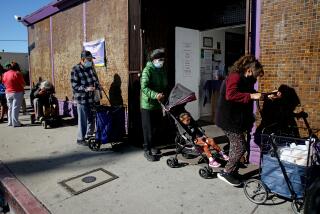Help, Don’t Hinder, Homeowners
- Share via
Some families lose their homes when they lose their jobs, others get evicted when landlords raise rents, and some are bulldozed out of their homes to make way for sports complexes and convention centers.
Now a new study reveals that almost 100,000 families across the nation--more than 9,000 in the Los Angeles metropolitan area--have lost their homes in part because of unscrupulous lenders, appraisers and private real estate agents who are not properly overseen by the Federal Housing Administration. Many other homeowners are at risk of losing their homes.
Ironically, an FHA program created to help working families purchase affordable homes often ends up being the means to evict them.
Los Angeles has more FHA properties facing imminent foreclosure than any other urban area in the country, according to a study by the Chicago-based National Training and Information Center. This is particularly a problem in minority and lower-income neighborhoods.
The epicenter for this national problem is a census tract in South-Central Los Angeles, where 40% of all families with FHA-insured loans are either at risk of losing their homes or have already lost them.
The FHA works like an insurance company for banks and mortgage companies--if a family with an FHA-insured loan falls too far behind in its mortgage payments, the federal government comes to the lender’s rescue.
Some lenders will not make mortgages in inner-city neighborhoods unless they are no-risk, FHA-insured loans.
The downside is that too many lenders make bad loans, often using unscrupulous practices, such as falsifying a family’s financial records and selling homes at inflated prices. In the last 34 years, the FHA has spent billions of dollars bailing lenders out.
Last month, the FBI uncovered one ring of FHA fraud in Los Angeles, Orange, Riverside and San Bernardino counties involving 30 real estate agents and mortgage brokers. Many families lost their homes. This $10-million scam, which is just the tip of the iceberg, reveals a clear double-standard in a program that is supposed to help lower-income people become homeowners.
It was the FHA that, after World War II, helped turn the U.S. into a nation of homeowners. From the 1940s through the 1960s, the FHA played a major role in enabling working families to purchase homes in booming suburbs--including the San Fernando Valley--by allowing lenders to make low-interest, low down-payment loans.
During that period, however, FHA loans promoted racial segregation by approving mortgages only to whites in the suburbs and primarily to minorities in the central city. FHA thus exacerbated “white flight” from the cities.
In 1968, Congress told the FHA to help minority, working-class families buy homes in urban neighborhoods where banks had historically discriminated against them. But for many of these families, much-vaunted home ownership has turned into a nightmare because the FHA has become a passive player rather than an active regulator.
Among other things, lenders are allowed to approve mortgages on homes that may require substantial repairs, unbeknownst to the buyer. Also, because the FHA insures the entire amount of the loan, lenders have no incentive to work out a payment plan to keep families in their homes. In addition, the FHA too often looks the other way while private real estate firms that it hires harass families and violate tenant rights laws to get them out.
Change is clearly needed. Congress must require the FHA to do better at monitoring lenders, appraisers and real estate brokers and, once the agency has identified where abuse is prevalent, punish those who participate in these practices by removing them from the program. As consumer groups such as the National Training and Information Center and ACORN, a national anti-poverty group, have suggested, the FHA must also work with homeowners--particularly those who have been subject to abuse by lenders--to help them stay in their homes.
Finally, where foreclosure is unavoidable, the FHA should work with community-based organizations and local governments to ensure that vacant buildings are quickly turned into affordable housing opportunities rather than be allowed to contribute to blight and neighborhood decay.
In fact, a program like this existed until recently in L.A., where the Enterprise Foundation was working with several nonprofit community organizations to repair more than 1,700 FHA-foreclosed homes and sell them to qualified working families. The Bush administration, which pulled the plug on this program a few months ago, should reinstate this program.
In short, the federal government must help rather than hinder homeownership in minority and low-income areas, and Congress must make sure the FHA lives up to this mission.
More to Read
Inside the business of entertainment
The Wide Shot brings you news, analysis and insights on everything from streaming wars to production — and what it all means for the future.
You may occasionally receive promotional content from the Los Angeles Times.










